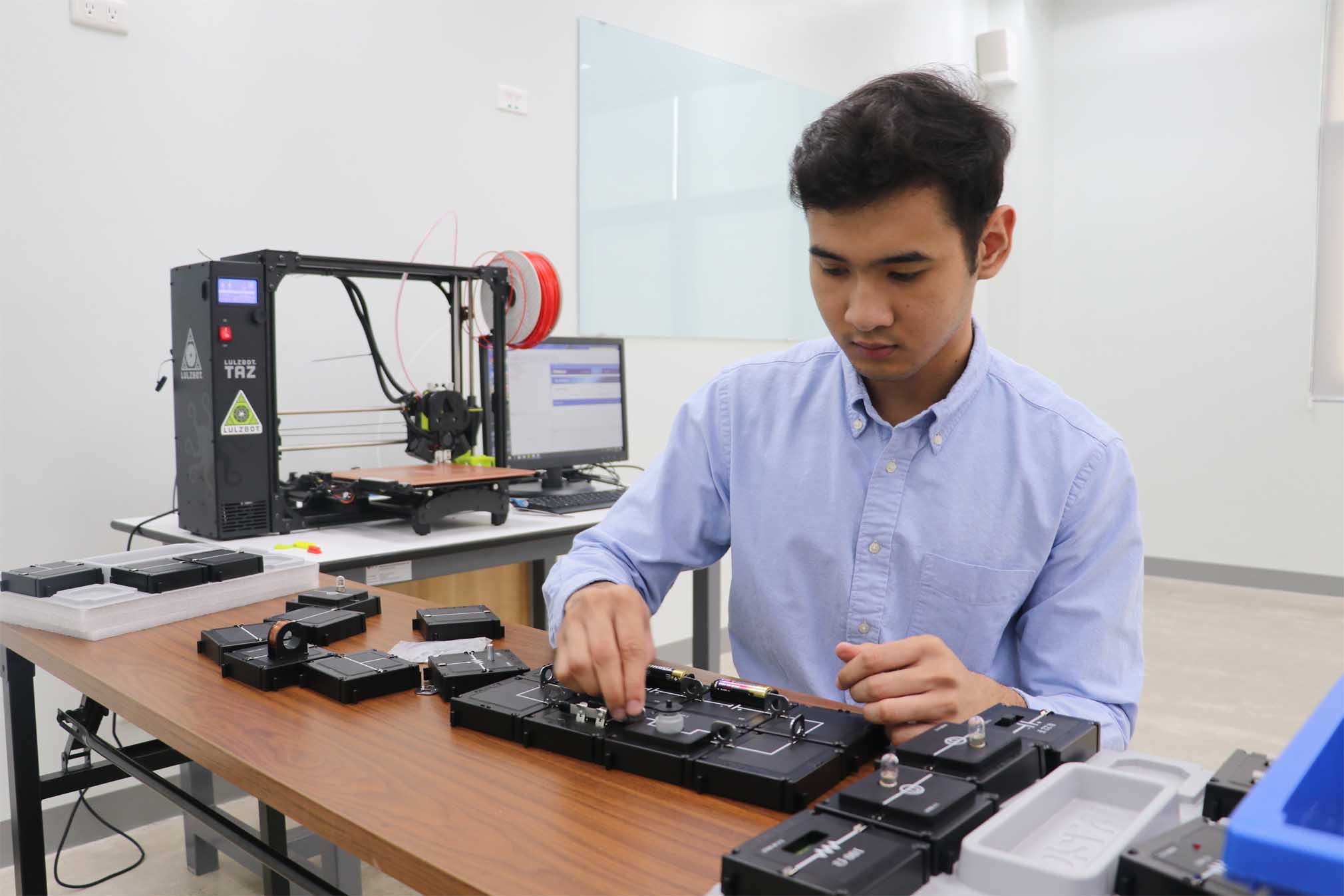Bachelor of Science in Computer Engineering (BSCpE)

BS Computer Engineering Program Overview
Mapúa’s BS Computer Engineering program centers on the learner’s acquisition of knowledge and development of expertise in computer, communication, and information technology. The program aids in fostering an excellent command of designing, developing, implementing, maintaining, and integrating computer hardware and software, and understanding their interdependence.
The BS CpE program fundamentally enhances mastery of computer engineering, its application, and its primary concepts to qualify students to meet the local and global standards in the field of computer engineering.
BS Computer Engineering Program Educational Objectives
- Graduates of the computer engineering program will have the technical skills and professional qualifications to become competent engineers who can support the industry, academe, or government.
- Graduates of the computer engineering program will be collaborators and innovators in the field, leading or participating in efforts to address social, technical, ethical, and business challenges.
- Graduates of the computer engineering program will be engaged in lifelong learning and professional development.
BS Computer Engineering Student Outcomes
Graduates of the Bachelor of Science in Computer Engineering program are expected to demonstrate:
- An ability to apply knowledge of mathematics, science, and engineering;
- An ability to design and conduct experiments, as well as to analyze and interpret data;
- An ability to design a system, component, or process to meet desired needs within realistic constraints such as economic, environmental, social, political, ethical, health and safety, manufacturability, and sustainability;
- An ability to function on multi-disciplinary teams;
- An ability to identify, formulate, and solve engineering problems;
- An understanding of professional and ethical responsibility;
- An ability to communicate effectively;
- The broad education necessary to understand the impact of engineering solutions in a global, economic, environmental, and societal context;
- A recognition of the need for, and an ability to engage in life-long learning;
- A knowledge of contemporary issues;
- An ability to use the techniques, skills and modern engineering tools necessary for engineering practice; and
- Knowledge and understanding of engineering and management principles as a member and leader in a team, to manage projects and in multidisciplinary environments.
BS Computer Engineering Career Opportunities

Systems Developer

Embedded Systems Engineer

Hardware Engineer

Network Engineer
BS Computer Engineering Program Curriculum
This is an introductory course in drawing designed to develop visual ability and means of visual expression through graphic renditions. This skill-building course allows students to learn the basic techniques and principles in drawing, which can be used in the pre-production and production stages of multimedia.
Course unit(s): 2.0 units
Credit hour(s): 1.5 hours (lec); 3.0 hours (lab)
Prerequisite(s): None
Co-requisite(s): None
This course intends to develop foundational skills in animation and other multimedia applications. It deals with the concepts and practices necessary to visually articulate three-dimensional life forms. Topics include human anatomy, contour lines, value, gesture, proportion, figure-ground relationship and composition.
Course unit(s): 2.0 units
Credit hour(s): 1.5 hours (lec); 3.0 hours (lab)
Prerequisite(s): MMA020P
Co-requisite(s): None
This is an introductory course that commences from a discussion on the history, principles, and practices, and the various visual, audio, and textual elements in the use of various media technologies in the production of multimedia expressions. Through understanding the fundamentals and trends in the Multimedia Industry, the course develop students’ competency in evaluating creative briefs and client requests and proposing solutions to their needs.
Course unit(s): 3.0 units
Credit hour(s): 4.5 hours (lec)
Prerequisite(s): None
Co-requisite(s): None
This course introduces the students to the origins of symbolic and pictographic communication, and the contexts and technological advances in the development of typography, printing, and illustration. It also discusses the key designers and design movements and their impact on contemporary image interpretation.
Course unit(s): 3.0 units
Credit hour(s): 4.5 hours (lec)
Prerequisite(s): None
Co-requisite(s): None
Orients the student on the basic elements of design chosen to convey the message – beyond the actual words or photos used. Knowledge on these basic elements determines how well a design communicates the desired message.
This course introduces the students to different principles and elements of design, methods of design, design and message conceptualization, and factors affecting design. It is intended to provide a solid foundation upon which further exploration in visual communication may be built.
Course unit(s): 3.0 units
Credit hour(s): 3.0 hours (lec), 4.5 hours (lab)
Prerequisite(s): MMA020P
Co-requisite(s): None
This course explores the basic elements and principles of color, introducing color design for a range of visual effects for multimedia projects. Topics include the development of color perception, expression, and application in traditional and digital arts.
Course unit(s): 3.0 units
Credit hour(s): 3.0 hours (lec), 4.5 hours (lab)
Prerequisite(s): MMA103P
Co-requisite(s): None
This course introduces students to the aesthetic principles and technical aspects of digital photography and aims to develop quality pixel-based photography. It provides students a background of creative and efficient uses of current tools and technologies such as digital darkroom computer programs to enhance images for various multimedia applications.
Course unit(s): 3.0 units
Credit hour(s): 3.0 hours (lec), 4.5 hours (lab)
Prerequisite(s): MMA103P
Co-requisite(s): None
This course introduces students to the fundamentals of good writing for different media genres and platforms, especially for new media such as blogs, websites, social networking sites, audio, video,and other media-convergent forms. Current trends and the future of digital media will be emphasized.
Course unit(s): 3.0 units
Credit hour(s): 4.5 hours (lec)
Prerequisite(s): ENG040
Co-requisite(s): None
This course introduces students to the craft of typography as the foundation of digital texts. Terminology in the field such as the type specification, copy-fitting, and kerning are discussed in relation to their impact to over-all layout and design. Students are taught the necessary rules and details associated with the proper setting of type in order to communicate in a clear and efficient manner.
Course unit(s): 3.0 units
Credit hour(s): 3.0 hours (lec), 4.5 hours (lab)
Prerequisite(s): MMA103P/ MMA104P
Co-requisite(s): None
This paired course utilizes Adobe Flash/Animate and Adobe After Effects to generate images and animations. Students will be working in a team environment with members assigned specific tasks such as animating, sound designing, drawing, directing and editing. A short flash animation running not less than 2 minutes is required for the final assessment.
Course unit(s): 3.0 units
Credit hour(s): 3.0 hours (lec), 4.5 hours (lab)
Prerequisite(s): MMA021P
Co-requisite(s): None
This course introduces the student to different aspects of film from historical, social, technical, and theoretical foundations of film as art. The course acquaints the student on how film is created through different aspects of film production. This course teaches the student that film is a formal construct can be understood.
Course unit(s): 3.0 units
Credit hour(s): 3.0 hours (lec), 4.5 hours (lab)
Prerequisite(s): MMA105P; MMA106
Co-requisite(s): None
The principles of design govern that placement and structure as they apply to typical desktop publishing projects including logos, ads, brochures, business cards, newsletters, books, and to some extent, web pages and other multimedia outputs.
Course unit(s): 3.0 units
Credit hour(s): 3.0 hours (lec), 4.5 hours (lab)
Prerequisite(s): MMA105P; MMA107P
Co-requisite(s): None
Ready to Apply?
If you’re ready to take the next step, start your journey through our quick, easy, and streamlined application process today.

